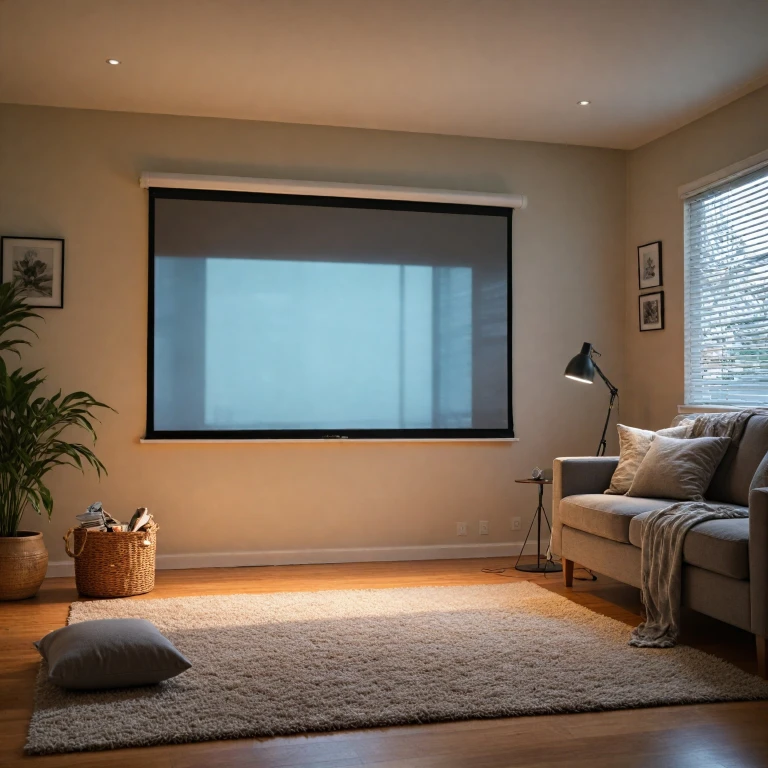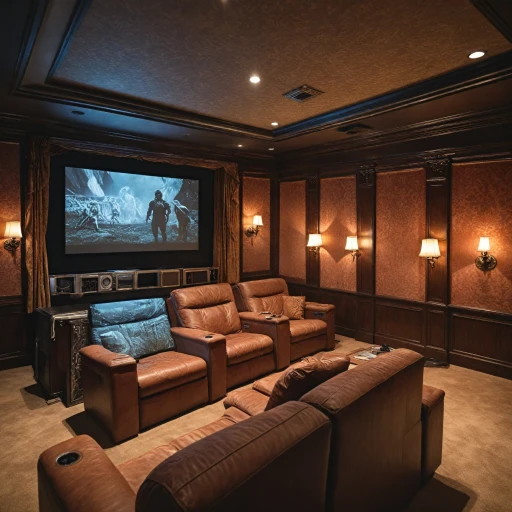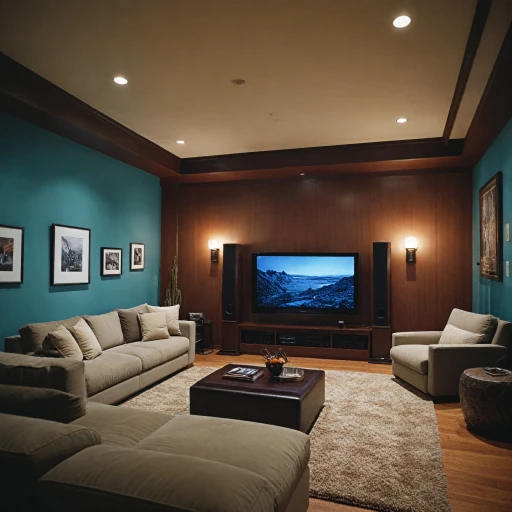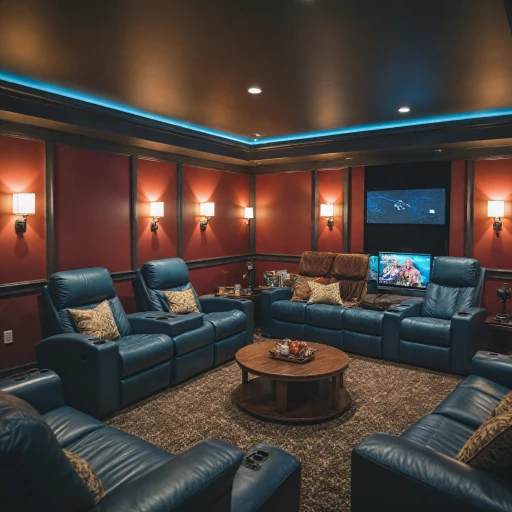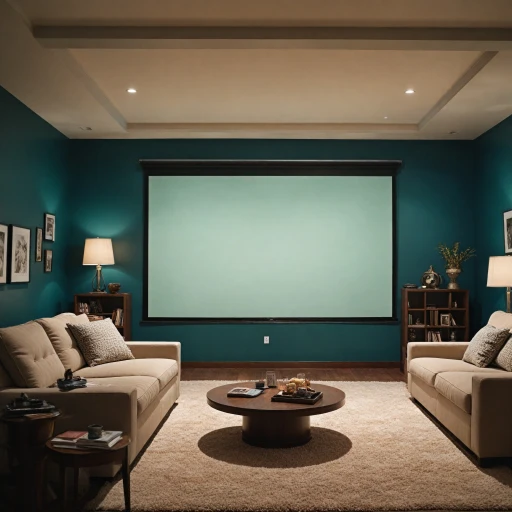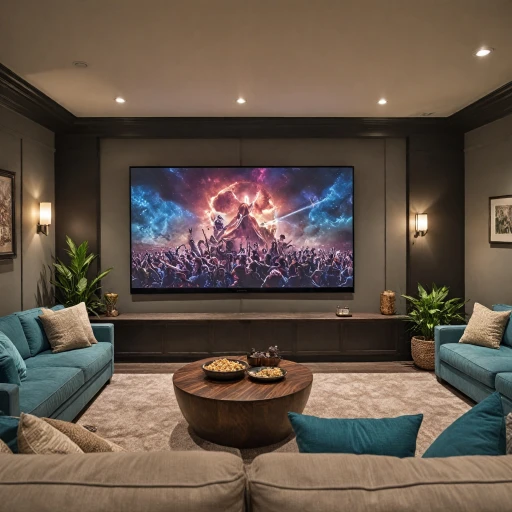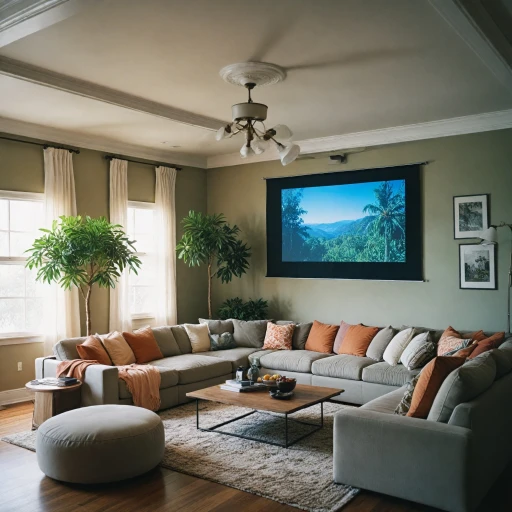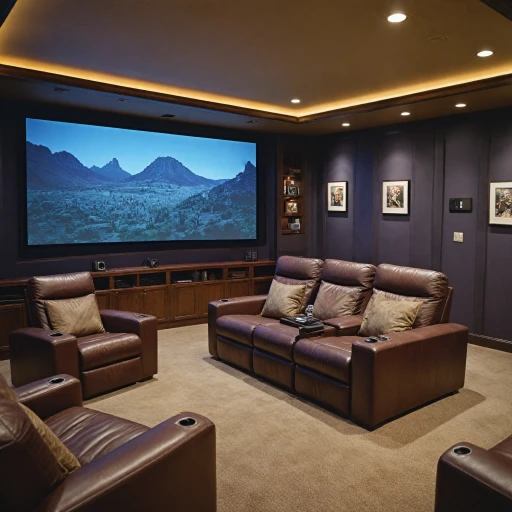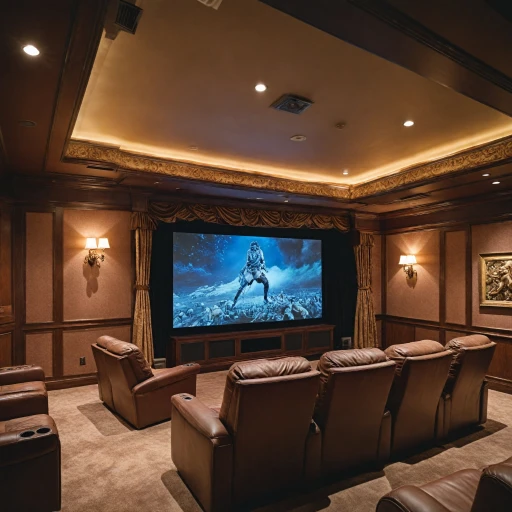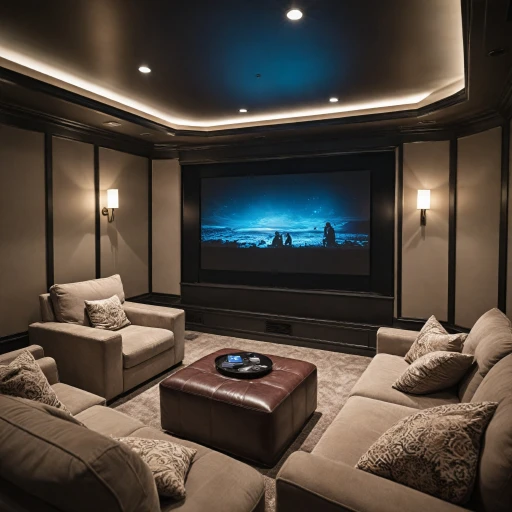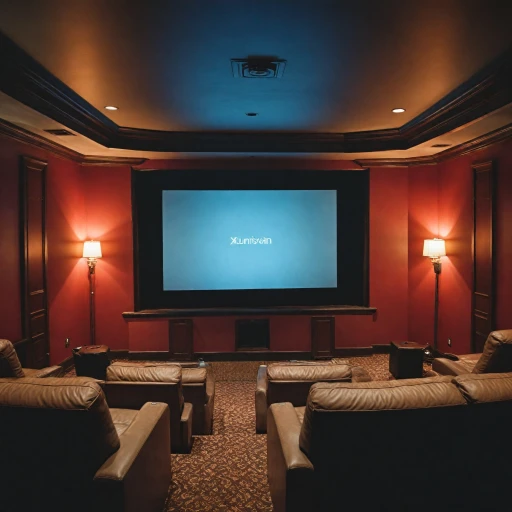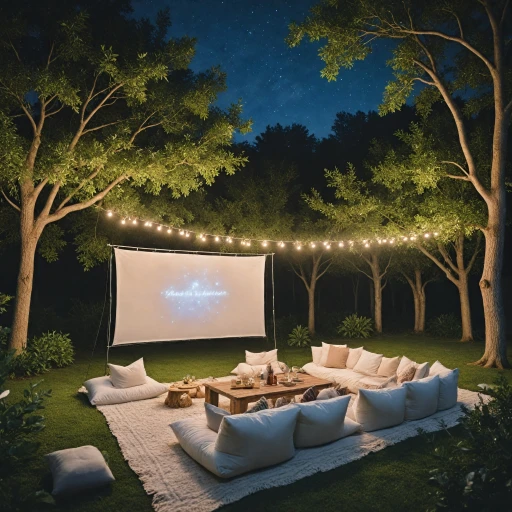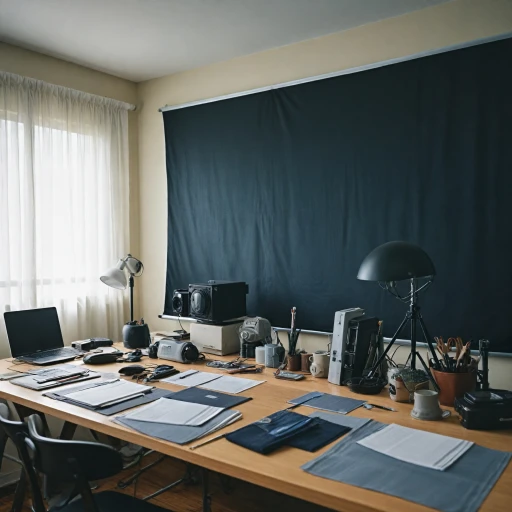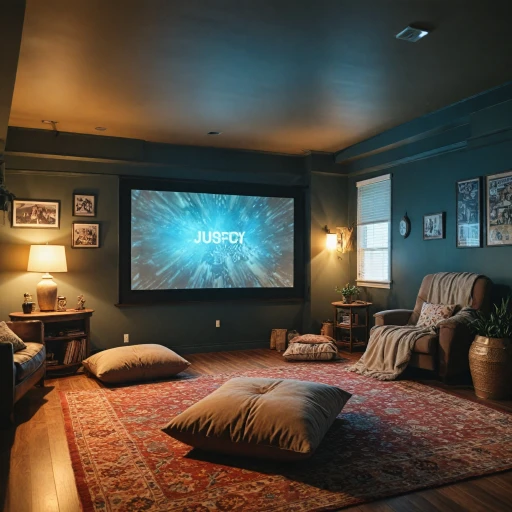
Understanding Your Projector Screen Material
Identifying the Material Type
The first step in maintaining your projector screen's optimal condition is understanding its material. Different screens, whether they are light rejecting, acoustically transparent, or made from other materials like fixed frame, each have specific cleaning needs. It's crucial to tailor your cleaning methods to your projector screen's material to ensure its longevity and uphold image quality.Types of Projector Screens
- Fixed Frame Screens – Typically feature a black frame and white screen surface. They provide a consistent tension across the entire screen, which is beneficial for maintaining a flat viewing surface.
- Motorized Screens – These can be rolled up or down and often come with ambient light rejecting surfaces to improve contrast ratios in lit environments. Care needs to be taken with the entire screen during the cleaning process to avoid damage.
Essential Cleaning Tools and Supplies
Gathering the Right Tools for Effective Cleaning
To ensure your projector screen remains in top condition, it's essential to use the right cleaning tools. Whether you have a motorized screen or a fixed frame model, these tools will assist in maintaining your screen's quality and performance.
- Microfiber cloth: Ideal for dust and smudge removal without scratching the surface. A microfiber cloth is indispensable in achieving a screen clean.
- Distilled water: Free from impurities, it prevents stubborn stains and does not damage screen materials, especially for those projection screens claiming to be ambient light rejecting or acoustically transparent.
- Cleaning solution: A mild, non-alcoholic cleaning solution, specifically designed for delicate surfaces, helps tackle harder-to-remove dirt.
- Screen-cleaning equipment: Specialized equipment may be necessary for motorized screens or larger setups to ensure the entire screen is taken care of.
It's also beneficial to check the specific cleaning recommendations for your screen type, as different materials may require unique care. Always ensure that your materials won't cause harm to any frame components, such as the
Step-by-Step Cleaning Process
Effective Cleaning Methods for Your Projection Screen
Ensuring your projector screen remains in pristine condition involves a careful cleaning process that maintains your image quality without causing any damage. Begin by assessing the type of screen you have, whether fixed frame, motorized, or light rejecting. Adjust your cleaning method accordingly to suit its specific needs.
Start by dusting the entire screen using a soft microfiber cloth, which helps in removing any loose dust particles without scratching the surface. For more stubborn stains, mix a small amount of mild cleaning solution with distilled water. Apply this mixture sparingly using a microfiber cloth, focusing on the spots that need extra attention. Remember, blot gently—rubbing can adversely affect your screen's performance.
For screens that have accumulated more grime, it's advisable to employ a gentle screen cleaning solution specifically designed for projection screens. If your screen is a motorized type, ensure to clean the mechanism periodically to prevent malfunctioning.
While cleaning, be mindful of the edges where the screen meets the frame. Accumulated dust or cleaning residue in these areas can impede the screen’s ability to retract, especially in motorized screens. Also, always clean projector screens in a well-lit environment to spot any areas that need extra care.
It's crucial to always use a quality microfiber cloth and avoid any harsh chemicals that might damage the screen material. In some cases where the screen is particularly delicate or has a special texture, consulting professional projection screen cleaning services may be beneficial.
Keep in mind that neglecting proper cleaning can affect the acoustics and ambient light handling of some screens, especially if it's an acoustically transparent or advanced screen type. Remember, performing regular checks and maintenance as part of your theater setup will ensure longevity and optimal performance. For further enhancements on your setup, consider recessed TV mounts which can offer aesthetic benefits alongside functionality.
Common Mistakes to Avoid
Avoiding Common Pitfalls
While cleaning your projector screen may seem straightforward, there are some common mistakes that could negatively impact your screen's quality. Here are a few key points to keep in mind:
- Using Incorrect Cleaning Solutions: Harsh chemicals or improper cleaning solutions can damage the surface of your screen. Always opt for a mild cleaning solution or a mixture of distilled water for safer cleaning.
- Neglecting to Use a Microfiber Cloth: It's essential to use a microfiber cloth rather than a regular cloth or paper towels. Microfiber is designed to gently remove dust and dirt without scratching or leaving fibers behind.
- Applying Excessive Pressure: Whether you’re cleaning a fixed frame, motorized, or acoustically transparent screen, avoid applying too much pressure. This can damage the screen surface and affect image quality.
- Skipping Frame Cleaning: Don’t forget the entire screen, including the frame. Dust and dirt can accumulate on the frame, affecting the overall viewing experience.
- Not Performing Regular Maintenance: Consistent maintenance prevents stubborn stains that require more aggressive cleaning methods. Routine care ensures your screen stays in good condition and enhances the projection.
By being mindful of these common mistakes, you'll ensure that your home theater continues to provide high-quality viewing experiences.
Regular Maintenance Tips
Maintain Your Projection Screen's Quality with Routine Upkeep
Preserving your projector screen's quality requires consistent care beyond just regular cleaning. Here are some practical tips for maintaining your screen to ensure it delivers the best image quality over time:
- Dust Control: Regularly dust your entire screen, especially if it's a fixed frame or motorized screen. Use a microfiber cloth, which is effective in picking up dust without leaving lint or scratching the surface. Routine dusting helps maintain a clear and sharp projection.
- Ambient Light Management: Consider investing in ambient light rejecting screen options to enhance your theater viewing experience. These screens help maintain image clarity even in rooms with some light, contributing to an extended lifespan of your projection screen.
- Storage Considerations: If you have a motorized projector screen, ensure it's fully retracted when not in use. This reduces exposure to dust and potential damage. For fixed frame projector screens, when not in use for extended periods, consider covering it with a light, breathable cloth to keep it clean.
- Frame and Mechanism Check: Regularly inspect the black frame and any motorized mechanisms. For motorized screens, listen for any unusual sounds during operation, which may indicate a need for cleaning or repairs.
- Professional Services: Engage cleaning services for your projection screens occasionally, especially for stubborn stains or if the screen becomes discolored. Professionals have cleaning solutions that won’t damage screens.
- Screen Cleaning Products: Use gentle screen cleaning solutions made of distilled water and ensure they’re suitable for your specific projector screen material. Regular usage prevents potential damage and maintains a consistent bright white projection surface.
By following these regular maintenance tips, you're not just keeping your screen clean, but also prolonging the life and effectiveness of your home theater setup.
Troubleshooting Screen Issues
Troubleshooting Common Screen Problems
Regular maintenance and proper cleaning techniques can keep your projector screen in prime condition. However, sometimes issues arise that require specific troubleshooting to ensure your viewing experience remains top-notch. Here are some frequent problems and effective solutions.
- Stubborn Stains: While using a gentle cleaning solution, stubborn stains might persist on the screen. A mixture of distilled water and white vinegar applied with a microfiber cloth can help. Be sure to use light, circular motions to avoid damage.
- Visible Dust: Dust can accumulate over time, affecting the image quality. Regularly dust the entire screen with a soft cloth or opt for acoustically transparent screens, which prevent dust from embedding into the surface.
- Frame Discoloration: Black or white frames can discolor due to exposure. Cleaning these with a damp microfiber cloth and mild detergent will generally restore them to their original shade.
- Motorized Screens Issues: For motorized screens, ensure motor parts are clean and free of dust. Lubricating the motor can help if the screen isn’t deploying smoothly.
- Light Rejecting Screens: When dealing with ambient light, light rejecting screens can enhance the viewing experience by maintaining clarity even in brighter settings.
- Screen Alignment: If your projection appears skewed, check that the screen’s black or white borders are properly aligned with the projector. Adjusting the frame or mounting may be necessary.
Ultimately, combining regular screening, thorough cleaning, and prompt troubleshooting will preserve the aesthetic and functional aspects of your projection screens. Always refer to the manufacturer's guidelines for specific maintenance advice and consider consulting services for professional repairs if necessary.

